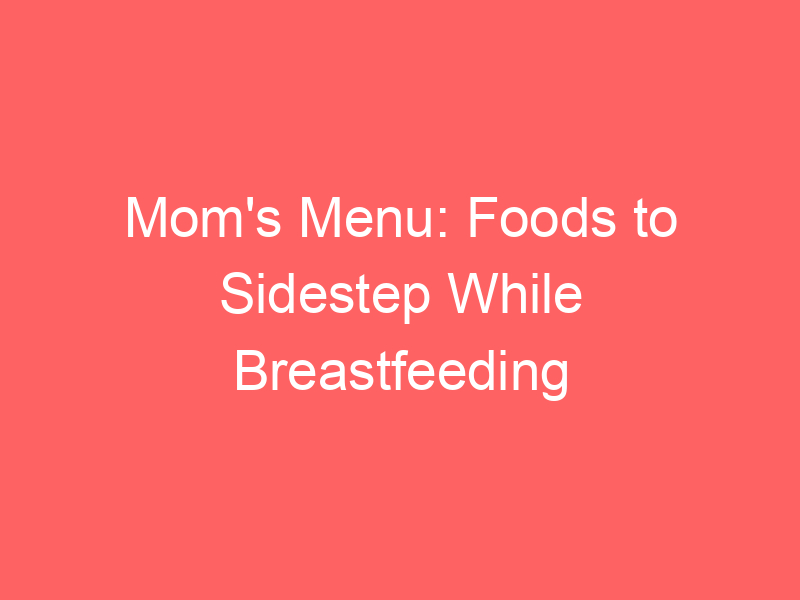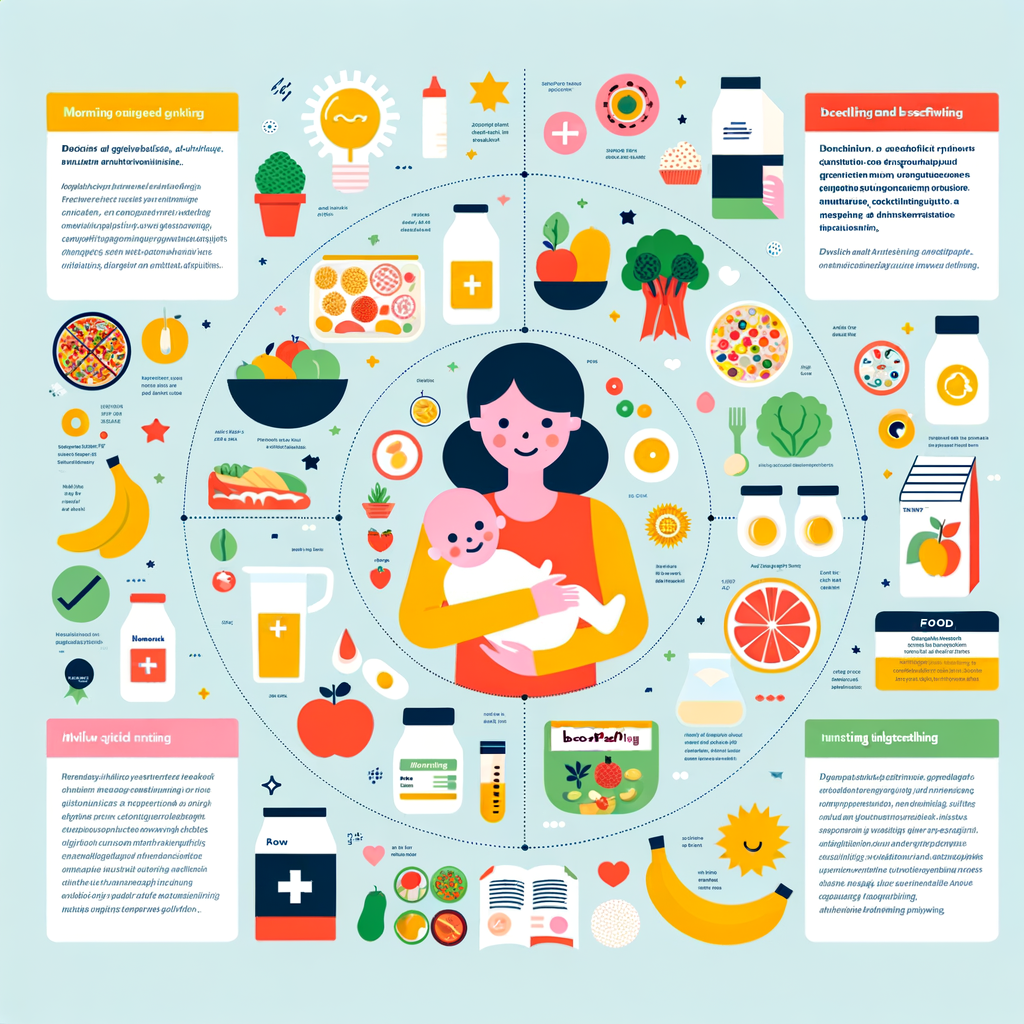Introduction to Maternal Nutrition and Breastfeeding
Welcome to our comprehensive guide on maternal nutrition and breastfeeding. This guide aims to provide clear and informative content on the importance of a healthy diet for nursing mothers and its impact on breastfeeding.
-
- Importance of a Healthy Diet for Nursing Mothers
Proper nutrition is crucial for all individuals, but it becomes even more significant when a woman is nursing. A healthy diet ensures that the mother is getting all the necessary nutrients to recover from childbirth and produce high-quality breast milk for her baby. According to the World Health Organization, breastfeeding mothers should increase their food intake to cover the energy cost of milk production.
-
- Impact of Maternal Diet on Breastfeeding
The diet of a nursing mother directly impacts the quality of breast milk. The nutrients that a mother consumes are passed on to the baby through breast milk. For instance, a diet rich in Omega-3 fatty acids can contribute to the baby’s brain development. Conversely, a diet lacking in essential nutrients can affect the baby’s growth and development.
In the following sections, we will delve deeper into the dietary guidelines for breastfeeding mothers, foods to avoid while breastfeeding, and case studies that highlight the impact of maternal nutrition on breastfeeding. Stay tuned to learn more about how to optimize your diet for the best breastfeeding outcomes.
Breastfeeding Dietary Guidelines
When it comes to breastfeeding, a mother’s diet plays a crucial role in providing essential nutrients to her baby. Here, we delve into the key nutrients that should be included in a breastfeeding diet.
Essential Nutrients in a Breastfeeding Diet
There are four main nutrients that are vital for a breastfeeding mother’s diet. These include protein, calcium, iron, and vitamins. Let’s explore each one in detail.
Protein
Protein is a building block for our bodies, playing a key role in the growth and development of your baby. It’s recommended that breastfeeding mothers consume an extra 25 grams of protein per day. Foods rich in protein include lean meats, eggs, dairy products, and legumes. (source)
Calcium
Calcium is essential for the development of your baby’s bones and teeth. Breastfeeding mothers should aim for at least 1000 milligrams of calcium per day. Dairy products, leafy green vegetables, and fortified foods are excellent sources of calcium. (source)
Iron
Iron is crucial for the production of hemoglobin, the protein in red blood cells that carries oxygen to your body’s tissues. It’s recommended that breastfeeding mothers consume 9 milligrams of iron per day. Iron-rich foods include lean meats, seafood, and fortified cereals. (source)
Vitamins
Vitamins are essential for overall health and well-being. Breastfeeding mothers should ensure they’re getting enough vitamins A, D, E, and K, as well as B vitamins. These can be found in a variety of foods, including fruits, vegetables, whole grains, and lean proteins. (source)
By incorporating these essential nutrients into your diet, you can ensure that you’re providing the best possible nutrition for your baby during this critical period of growth and development.
Hydration and Breastfeeding
Hydration plays a crucial role in the breastfeeding journey. It not only helps in milk production but also ensures the overall well-being of the mother. Let’s delve deeper into the importance of staying hydrated and making healthy hydration choices during this period.
-
- Importance of Staying Hydrated
Staying hydrated is essential for every individual, but it becomes even more critical for breastfeeding mothers. The human body uses water to make breast milk, which is about 90% water. Therefore, a lack of hydration can potentially affect the milk supply. According to a study, breastfeeding mothers should drink at least 8 cups of water per day to maintain adequate hydration levels. This not only supports milk production but also helps in maintaining energy levels and aids in postpartum recovery.
-
- Healthy Hydration Choices
While water is the best source of hydration, breastfeeding mothers can also incorporate other healthy beverages into their diet. These include milk, which provides additional calcium, and natural fruit juices, which can offer essential vitamins. However, it’s important to limit the intake of caffeinated drinks like coffee and tea, as caffeine can pass into breast milk and may affect the baby. Also, avoid sugary drinks as they can lead to weight gain and other health issues. Remember, the goal is to make hydration choices that benefit both the mother and the baby.
In conclusion, hydration is a key component of a healthy breastfeeding diet. By understanding its importance and making healthy hydration choices, breastfeeding mothers can ensure they are providing the best nutrition for their babies while also taking care of their own health.
Foods to Avoid While Breastfeeding
When you’re breastfeeding, your baby’s nutrition depends on what you eat and drink. Certain foods and beverages can affect your breast milk and may not be healthy for your baby. Here are some common foods that can be harmful during breastfeeding.
Common Foods Harmful for Breastfeeding
Caffeine
While it’s okay to have a cup of coffee or tea, too much caffeine can cause problems. High levels of caffeine can make your baby restless, irritable, and may interfere with their sleep. It’s recommended to limit your caffeine intake to no more than 300 mg per day, which is about 2-3 cups of coffee.
Alcohol
Alcohol can pass into breast milk and can affect your baby’s development. If you choose to drink, it’s best to do so just after you’ve nursed or pumped milk, not before, and allow at least 2 hours per drink before the next breastfeeding or pumping session to give your body time to clear the alcohol.
Certain Seafood
Some types of fish, such as shark, swordfish, king mackerel, and tilefish, are high in mercury, which can harm your baby’s developing nervous system. It’s best to avoid these types of fish while you’re breastfeeding. Instead, opt for seafood that’s low in mercury, like salmon, shrimp, and catfish.
Remember, a healthy diet is essential for both you and your baby during this time. If you have any concerns about your diet or how it might affect your breast milk, don’t hesitate to speak with your healthcare provider.
Breastfeeding and Food Restrictions
When breastfeeding, it’s important to be mindful of the foods you consume. Certain types of foods can potentially affect your baby’s health and wellbeing. Here, we will explore three categories of foods that breastfeeding mothers should be cautious about: allergenic foods, spicy foods, and processed foods.
-
- Allergenic Foods
Allergenic foods are those that are known to cause allergic reactions in some individuals. Common allergenic foods include dairy, eggs, peanuts, tree nuts, fish, shellfish, wheat, and soy. While not all babies will react to these foods, some may be more sensitive. If you notice any signs of an allergic reaction in your baby, such as rash, hives, or difficulty breathing, it’s best to consult with a healthcare professional. Learn more about allergenic foods here.
-
- Spicy Foods
Spicy foods are a staple in many diets around the world. However, some babies may react to the spices in breast milk. This doesn’t mean you have to avoid spicy foods altogether, but it’s important to monitor your baby’s reaction. If your baby seems fussy or has a diaper rash after you’ve eaten spicy food, it might be best to limit your intake. Find out more about spices here.
-
- Processed Foods
Processed foods often contain additives, preservatives, and high levels of salt and sugar. These are not beneficial for your baby’s health. While it’s not always possible to avoid processed foods completely, try to limit your intake and focus on fresh, whole foods whenever possible. Learn more about processed foods here.
In conclusion, while breastfeeding, it’s crucial to be aware of the potential impacts of your diet on your baby. By being mindful of allergenic, spicy, and processed foods, you can ensure that your baby gets the best possible nutrition.
Case Studies: Impact of Maternal Nutrition on Breastfeeding
Let’s delve into some real-life examples to better understand how a mother’s nutrition can affect her ability to breastfeed. We will look at two case studies that highlight the importance of a balanced diet and the effects of poor nutrition.
-
- Case Study 1: Impact of a Balanced Diet
Meet Jane, a new mother who maintained a balanced diet throughout her pregnancy and continued to do so while breastfeeding. Jane’s diet was rich in fruits, vegetables, whole grains, lean proteins, and healthy fats. She also ensured she stayed hydrated and took her prenatal vitamins.
As a result, Jane had a steady supply of breast milk. Her baby was healthy, gaining weight at a normal pace, and rarely fell sick. This case study demonstrates the positive impact of a balanced diet on breastfeeding. A well-rounded diet not only ensures the mother’s health but also provides the baby with all the necessary nutrients for growth and development.
-
- Case Study 2: Effects of Poor Nutrition
Now, let’s consider Lisa, another new mother who, unlike Jane, had a poor diet. Lisa often skipped meals, consumed a lot of processed foods, and rarely ate fruits and vegetables. She also did not drink enough water and often forgot to take her vitamins.
Unfortunately, Lisa struggled with breastfeeding. Her milk supply was inconsistent, and her baby had trouble gaining weight. Lisa’s baby also fell sick more often than Jane’s baby. This case study clearly shows how poor maternal nutrition can negatively affect breastfeeding and the baby’s health.
These case studies highlight the importance of proper nutrition for breastfeeding mothers. A balanced diet can significantly improve the breastfeeding experience, while poor nutrition can lead to complications. Therefore, it is crucial for new mothers to maintain a healthy diet and stay hydrated for their well-being and their baby’s health.
Key Takeaways: Diet for Breastfeeding Mothers
-
Importance of a Balanced Diet
For breastfeeding mothers, a balanced diet is crucial. It not only ensures your own health but also impacts the quality of breast milk. Consuming a variety of foods from all food groups – proteins, carbohydrates, fruits, vegetables, and dairy – provides essential nutrients for both mother and baby. According to the American Dietetic Association, breastfeeding mothers should aim for a diet rich in iron, protein, and calcium.
-
Understanding Foods to Sidestep
While it’s important to eat a variety of foods, some should be avoided or limited during breastfeeding. These include high-mercury fish, excessive caffeine, and alcohol. Certain foods can also cause allergies or sensitivities in babies. If you notice any adverse reactions in your baby after eating a particular food, it’s best to consult your doctor.
-
Staying Hydrated
Hydration is key for breastfeeding mothers. Drinking enough water not only keeps you hydrated but also helps maintain your milk supply. While the exact amount of water needed can vary, a good rule of thumb is to drink a glass of water every time you breastfeed.
-
Impact of Diet on Breastfeeding
Your diet directly affects the quality and quantity of your breast milk. A nutritious diet can enhance the nutritional content of your milk, support your baby’s growth and development, and help maintain your own health. On the other hand, a poor diet can lead to nutrient deficiencies and affect milk production. Remember, what you eat, your baby eats too.















